Efficient Market Hypothesis (EMH) and Financial Manager's Perspective
VerifiedAdded on 2020/10/10
|6
|2261
|465
Essay
AI Summary
This essay delves into the Efficient Market Hypothesis (EMH), a cornerstone of financial theory, examining its three forms: weak, semi-strong, and strong. It explains how these forms reflect different levels of information efficiency in capital markets, influencing price behavior and investment strategies. The essay critically evaluates the EMH's significance for financial managers, highlighting how it guides investment decisions, risk management, and capital allocation. Real-world examples, including Bitcoin, Tesla, and Netflix, illustrate the practical implications of EMH in various market scenarios. The analysis underscores the importance of understanding market efficiency for financial managers to make informed decisions, manage investments effectively, and achieve their stakeholders' financial goals.
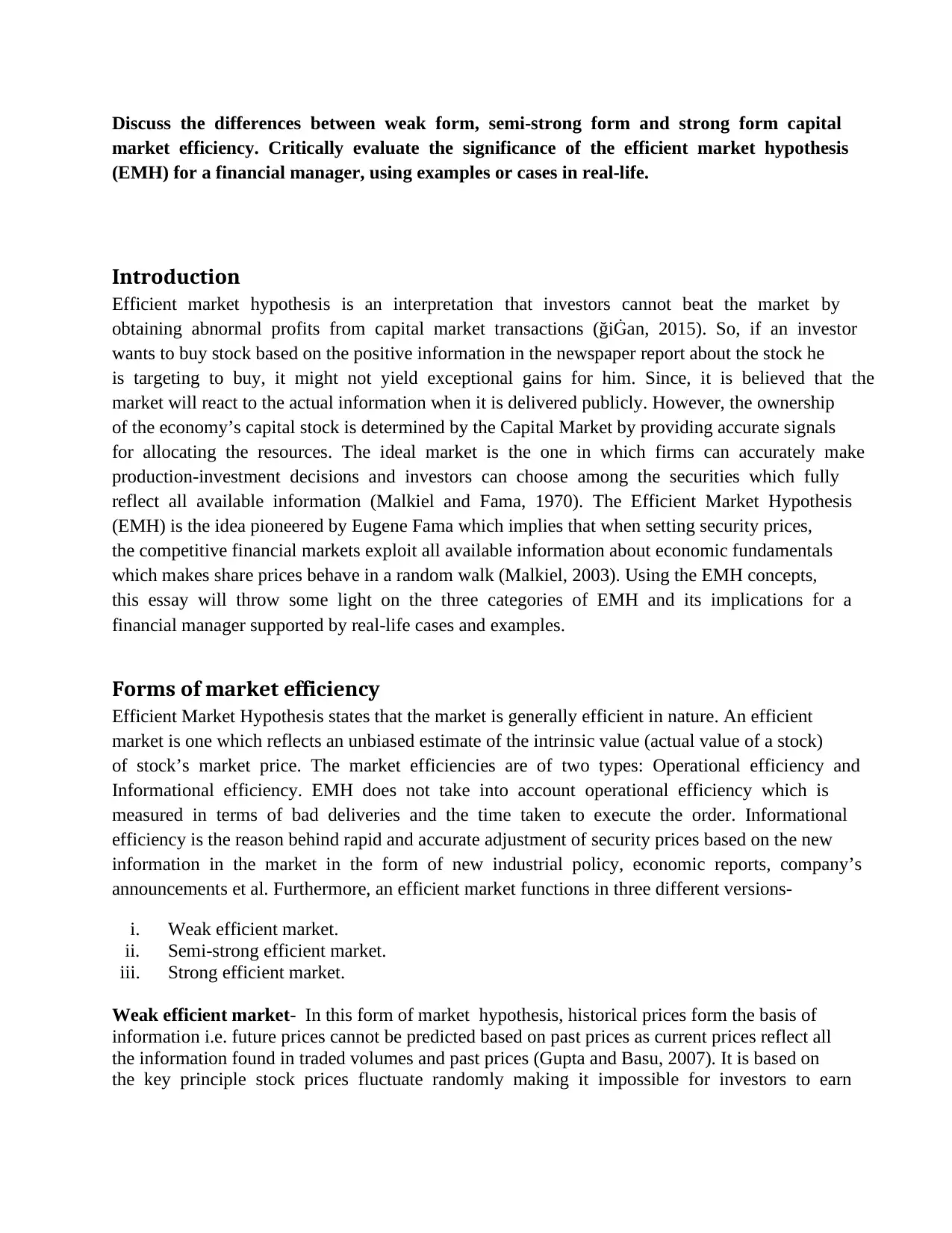
Discuss the differences between weak form, semi-strong form and strong form capital
market efficiency. Critically evaluate the significance of the efficient market hypothesis
(EMH) for a financial manager, using examples or cases in real-life.
Introduction
Efficient market hypothesis is an interpretation that investors cannot beat the market by
obtaining abnormal profits from capital market transactions (ğiĠan, 2015). So, if an investor
wants to buy stock based on the positive information in the newspaper report about the stock he
is targeting to buy, it might not yield exceptional gains for him. Since, it is believed that the
market will react to the actual information when it is delivered publicly. However, the ownership
of the economy’s capital stock is determined by the Capital Market by providing accurate signals
for allocating the resources. The ideal market is the one in which firms can accurately make
production-investment decisions and investors can choose among the securities which fully
reflect all available information (Malkiel and Fama, 1970). The Efficient Market Hypothesis
(EMH) is the idea pioneered by Eugene Fama which implies that when setting security prices,
the competitive financial markets exploit all available information about economic fundamentals
which makes share prices behave in a random walk (Malkiel, 2003). Using the EMH concepts,
this essay will throw some light on the three categories of EMH and its implications for a
financial manager supported by real-life cases and examples.
Forms of market efficiency
Efficient Market Hypothesis states that the market is generally efficient in nature. An efficient
market is one which reflects an unbiased estimate of the intrinsic value (actual value of a stock)
of stock’s market price. The market efficiencies are of two types: Operational efficiency and
Informational efficiency. EMH does not take into account operational efficiency which is
measured in terms of bad deliveries and the time taken to execute the order. Informational
efficiency is the reason behind rapid and accurate adjustment of security prices based on the new
information in the market in the form of new industrial policy, economic reports, company’s
announcements et al. Furthermore, an efficient market functions in three different versions-
i. Weak efficient market.
ii. Semi-strong efficient market.
iii. Strong efficient market.
Weak efficient market- In this form of market hypothesis, historical prices form the basis of
information i.e. future prices cannot be predicted based on past prices as current prices reflect all
the information found in traded volumes and past prices (Gupta and Basu, 2007). It is based on
the key principle stock prices fluctuate randomly making it impossible for investors to earn
market efficiency. Critically evaluate the significance of the efficient market hypothesis
(EMH) for a financial manager, using examples or cases in real-life.
Introduction
Efficient market hypothesis is an interpretation that investors cannot beat the market by
obtaining abnormal profits from capital market transactions (ğiĠan, 2015). So, if an investor
wants to buy stock based on the positive information in the newspaper report about the stock he
is targeting to buy, it might not yield exceptional gains for him. Since, it is believed that the
market will react to the actual information when it is delivered publicly. However, the ownership
of the economy’s capital stock is determined by the Capital Market by providing accurate signals
for allocating the resources. The ideal market is the one in which firms can accurately make
production-investment decisions and investors can choose among the securities which fully
reflect all available information (Malkiel and Fama, 1970). The Efficient Market Hypothesis
(EMH) is the idea pioneered by Eugene Fama which implies that when setting security prices,
the competitive financial markets exploit all available information about economic fundamentals
which makes share prices behave in a random walk (Malkiel, 2003). Using the EMH concepts,
this essay will throw some light on the three categories of EMH and its implications for a
financial manager supported by real-life cases and examples.
Forms of market efficiency
Efficient Market Hypothesis states that the market is generally efficient in nature. An efficient
market is one which reflects an unbiased estimate of the intrinsic value (actual value of a stock)
of stock’s market price. The market efficiencies are of two types: Operational efficiency and
Informational efficiency. EMH does not take into account operational efficiency which is
measured in terms of bad deliveries and the time taken to execute the order. Informational
efficiency is the reason behind rapid and accurate adjustment of security prices based on the new
information in the market in the form of new industrial policy, economic reports, company’s
announcements et al. Furthermore, an efficient market functions in three different versions-
i. Weak efficient market.
ii. Semi-strong efficient market.
iii. Strong efficient market.
Weak efficient market- In this form of market hypothesis, historical prices form the basis of
information i.e. future prices cannot be predicted based on past prices as current prices reflect all
the information found in traded volumes and past prices (Gupta and Basu, 2007). It is based on
the key principle stock prices fluctuate randomly making it impossible for investors to earn
Paraphrase This Document
Need a fresh take? Get an instant paraphrase of this document with our AI Paraphraser
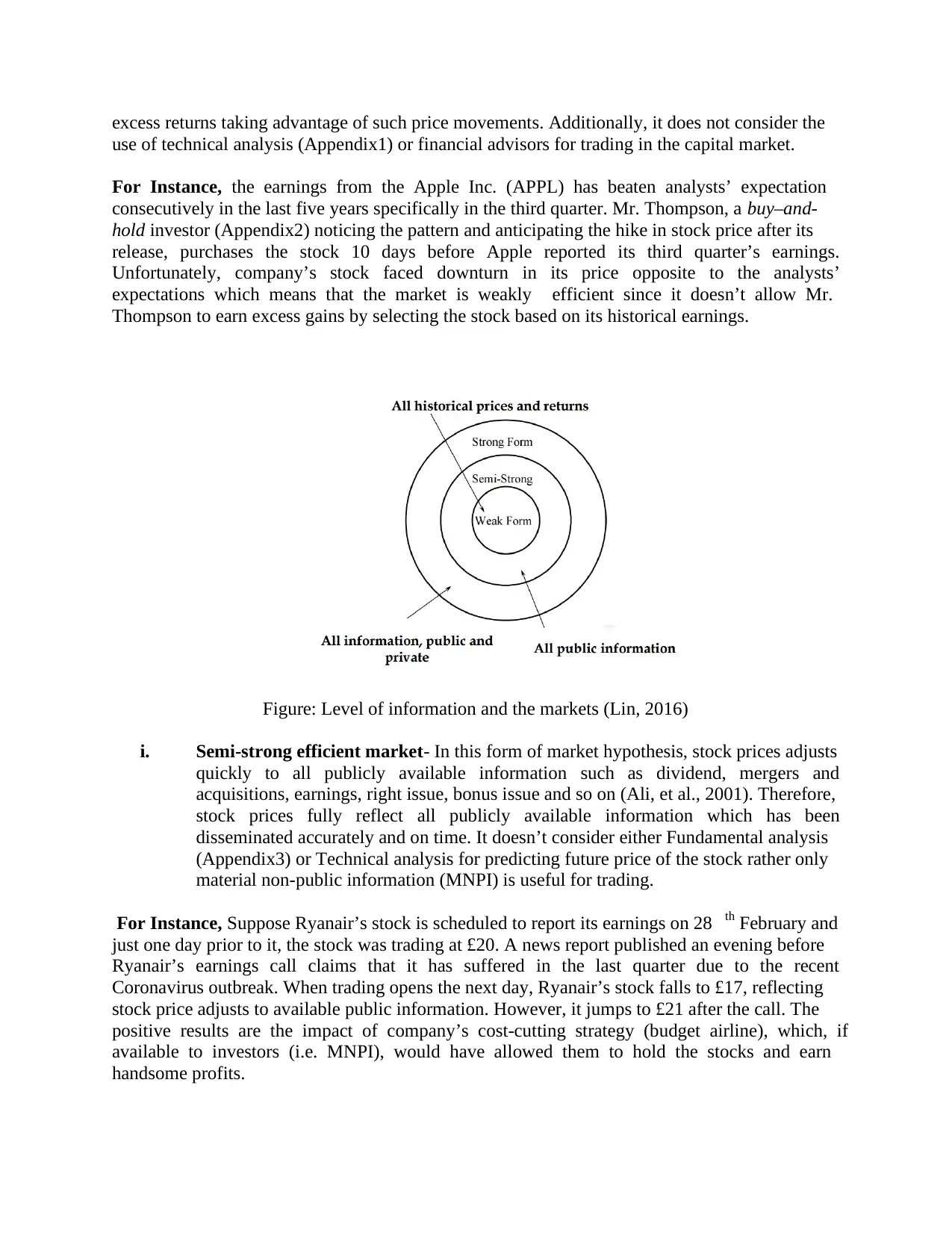
excess returns taking advantage of such price movements. Additionally, it does not consider the
use of technical analysis (Appendix1) or financial advisors for trading in the capital market.
For Instance, the earnings from the Apple Inc. (APPL) has beaten analysts’ expectation
consecutively in the last five years specifically in the third quarter. Mr. Thompson, a buy–and-
hold investor (Appendix2) noticing the pattern and anticipating the hike in stock price after its
release, purchases the stock 10 days before Apple reported its third quarter’s earnings.
Unfortunately, company’s stock faced downturn in its price opposite to the analysts’
expectations which means that the market is weakly efficient since it doesn’t allow Mr.
Thompson to earn excess gains by selecting the stock based on its historical earnings.
Figure: Level of information and the markets (Lin, 2016)
i. Semi-strong efficient market- In this form of market hypothesis, stock prices adjusts
quickly to all publicly available information such as dividend, mergers and
acquisitions, earnings, right issue, bonus issue and so on (Ali, et al., 2001). Therefore,
stock prices fully reflect all publicly available information which has been
disseminated accurately and on time. It doesn’t consider either Fundamental analysis
(Appendix3) or Technical analysis for predicting future price of the stock rather only
material non-public information (MNPI) is useful for trading.
For Instance, Suppose Ryanair’s stock is scheduled to report its earnings on 28 th February and
just one day prior to it, the stock was trading at £20. A news report published an evening before
Ryanair’s earnings call claims that it has suffered in the last quarter due to the recent
Coronavirus outbreak. When trading opens the next day, Ryanair’s stock falls to £17, reflecting
stock price adjusts to available public information. However, it jumps to £21 after the call. The
positive results are the impact of company’s cost-cutting strategy (budget airline), which, if
available to investors (i.e. MNPI), would have allowed them to hold the stocks and earn
handsome profits.
use of technical analysis (Appendix1) or financial advisors for trading in the capital market.
For Instance, the earnings from the Apple Inc. (APPL) has beaten analysts’ expectation
consecutively in the last five years specifically in the third quarter. Mr. Thompson, a buy–and-
hold investor (Appendix2) noticing the pattern and anticipating the hike in stock price after its
release, purchases the stock 10 days before Apple reported its third quarter’s earnings.
Unfortunately, company’s stock faced downturn in its price opposite to the analysts’
expectations which means that the market is weakly efficient since it doesn’t allow Mr.
Thompson to earn excess gains by selecting the stock based on its historical earnings.
Figure: Level of information and the markets (Lin, 2016)
i. Semi-strong efficient market- In this form of market hypothesis, stock prices adjusts
quickly to all publicly available information such as dividend, mergers and
acquisitions, earnings, right issue, bonus issue and so on (Ali, et al., 2001). Therefore,
stock prices fully reflect all publicly available information which has been
disseminated accurately and on time. It doesn’t consider either Fundamental analysis
(Appendix3) or Technical analysis for predicting future price of the stock rather only
material non-public information (MNPI) is useful for trading.
For Instance, Suppose Ryanair’s stock is scheduled to report its earnings on 28 th February and
just one day prior to it, the stock was trading at £20. A news report published an evening before
Ryanair’s earnings call claims that it has suffered in the last quarter due to the recent
Coronavirus outbreak. When trading opens the next day, Ryanair’s stock falls to £17, reflecting
stock price adjusts to available public information. However, it jumps to £21 after the call. The
positive results are the impact of company’s cost-cutting strategy (budget airline), which, if
available to investors (i.e. MNPI), would have allowed them to hold the stocks and earn
handsome profits.
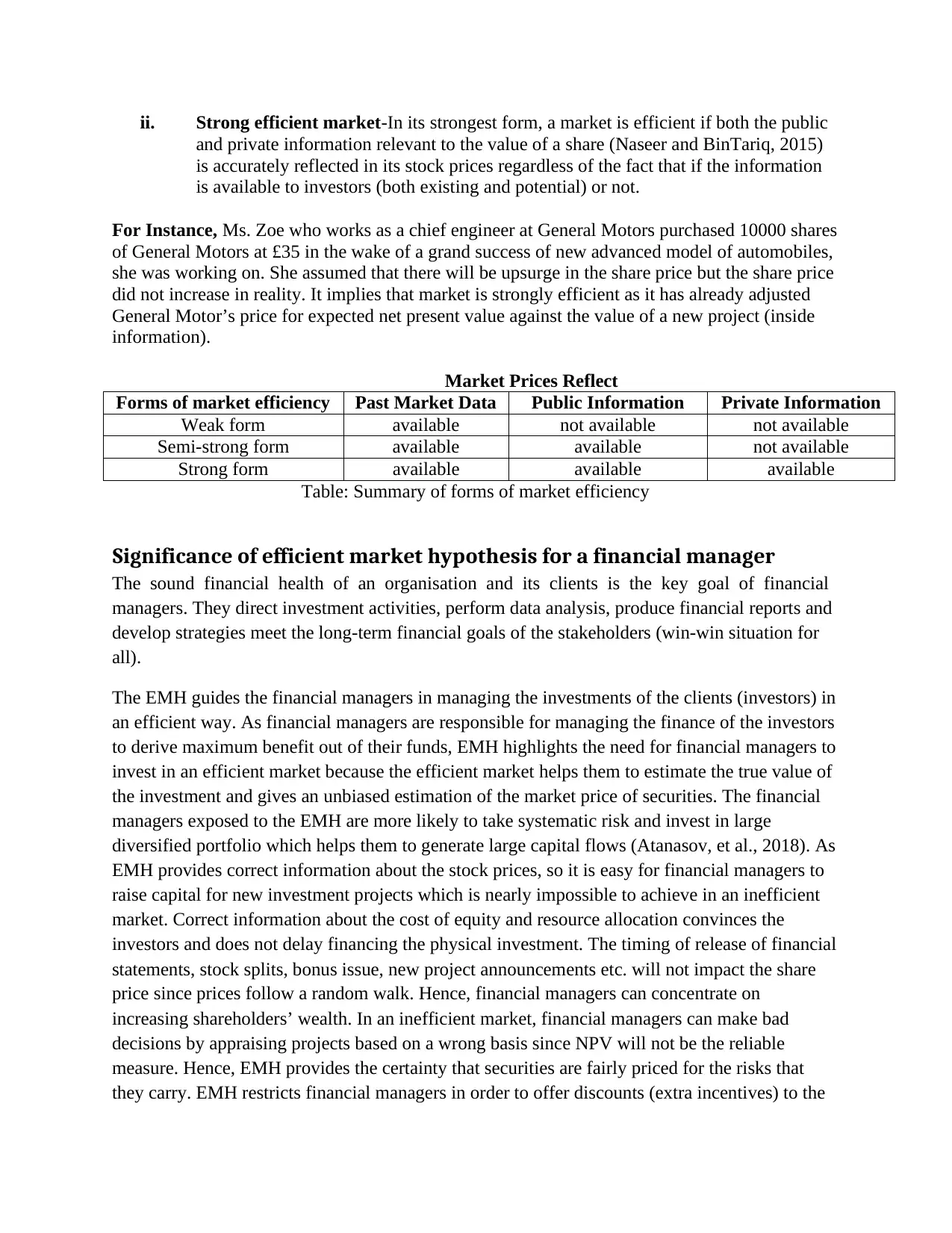
ii. Strong efficient market-In its strongest form, a market is efficient if both the public
and private information relevant to the value of a share (Naseer and BinTariq, 2015)
is accurately reflected in its stock prices regardless of the fact that if the information
is available to investors (both existing and potential) or not.
For Instance, Ms. Zoe who works as a chief engineer at General Motors purchased 10000 shares
of General Motors at £35 in the wake of a grand success of new advanced model of automobiles,
she was working on. She assumed that there will be upsurge in the share price but the share price
did not increase in reality. It implies that market is strongly efficient as it has already adjusted
General Motor’s price for expected net present value against the value of a new project (inside
information).
Market Prices Reflect
Forms of market efficiency Past Market Data Public Information Private Information
Weak form available not available not available
Semi-strong form available available not available
Strong form available available available
Table: Summary of forms of market efficiency
Significance of efficient market hypothesis for a financial manager
The sound financial health of an organisation and its clients is the key goal of financial
managers. They direct investment activities, perform data analysis, produce financial reports and
develop strategies meet the long-term financial goals of the stakeholders (win-win situation for
all).
The EMH guides the financial managers in managing the investments of the clients (investors) in
an efficient way. As financial managers are responsible for managing the finance of the investors
to derive maximum benefit out of their funds, EMH highlights the need for financial managers to
invest in an efficient market because the efficient market helps them to estimate the true value of
the investment and gives an unbiased estimation of the market price of securities. The financial
managers exposed to the EMH are more likely to take systematic risk and invest in large
diversified portfolio which helps them to generate large capital flows (Atanasov, et al., 2018). As
EMH provides correct information about the stock prices, so it is easy for financial managers to
raise capital for new investment projects which is nearly impossible to achieve in an inefficient
market. Correct information about the cost of equity and resource allocation convinces the
investors and does not delay financing the physical investment. The timing of release of financial
statements, stock splits, bonus issue, new project announcements etc. will not impact the share
price since prices follow a random walk. Hence, financial managers can concentrate on
increasing shareholders’ wealth. In an inefficient market, financial managers can make bad
decisions by appraising projects based on a wrong basis since NPV will not be the reliable
measure. Hence, EMH provides the certainty that securities are fairly priced for the risks that
they carry. EMH restricts financial managers in order to offer discounts (extra incentives) to the
and private information relevant to the value of a share (Naseer and BinTariq, 2015)
is accurately reflected in its stock prices regardless of the fact that if the information
is available to investors (both existing and potential) or not.
For Instance, Ms. Zoe who works as a chief engineer at General Motors purchased 10000 shares
of General Motors at £35 in the wake of a grand success of new advanced model of automobiles,
she was working on. She assumed that there will be upsurge in the share price but the share price
did not increase in reality. It implies that market is strongly efficient as it has already adjusted
General Motor’s price for expected net present value against the value of a new project (inside
information).
Market Prices Reflect
Forms of market efficiency Past Market Data Public Information Private Information
Weak form available not available not available
Semi-strong form available available not available
Strong form available available available
Table: Summary of forms of market efficiency
Significance of efficient market hypothesis for a financial manager
The sound financial health of an organisation and its clients is the key goal of financial
managers. They direct investment activities, perform data analysis, produce financial reports and
develop strategies meet the long-term financial goals of the stakeholders (win-win situation for
all).
The EMH guides the financial managers in managing the investments of the clients (investors) in
an efficient way. As financial managers are responsible for managing the finance of the investors
to derive maximum benefit out of their funds, EMH highlights the need for financial managers to
invest in an efficient market because the efficient market helps them to estimate the true value of
the investment and gives an unbiased estimation of the market price of securities. The financial
managers exposed to the EMH are more likely to take systematic risk and invest in large
diversified portfolio which helps them to generate large capital flows (Atanasov, et al., 2018). As
EMH provides correct information about the stock prices, so it is easy for financial managers to
raise capital for new investment projects which is nearly impossible to achieve in an inefficient
market. Correct information about the cost of equity and resource allocation convinces the
investors and does not delay financing the physical investment. The timing of release of financial
statements, stock splits, bonus issue, new project announcements etc. will not impact the share
price since prices follow a random walk. Hence, financial managers can concentrate on
increasing shareholders’ wealth. In an inefficient market, financial managers can make bad
decisions by appraising projects based on a wrong basis since NPV will not be the reliable
measure. Hence, EMH provides the certainty that securities are fairly priced for the risks that
they carry. EMH restricts financial managers in order to offer discounts (extra incentives) to the
⊘ This is a preview!⊘
Do you want full access?
Subscribe today to unlock all pages.

Trusted by 1+ million students worldwide
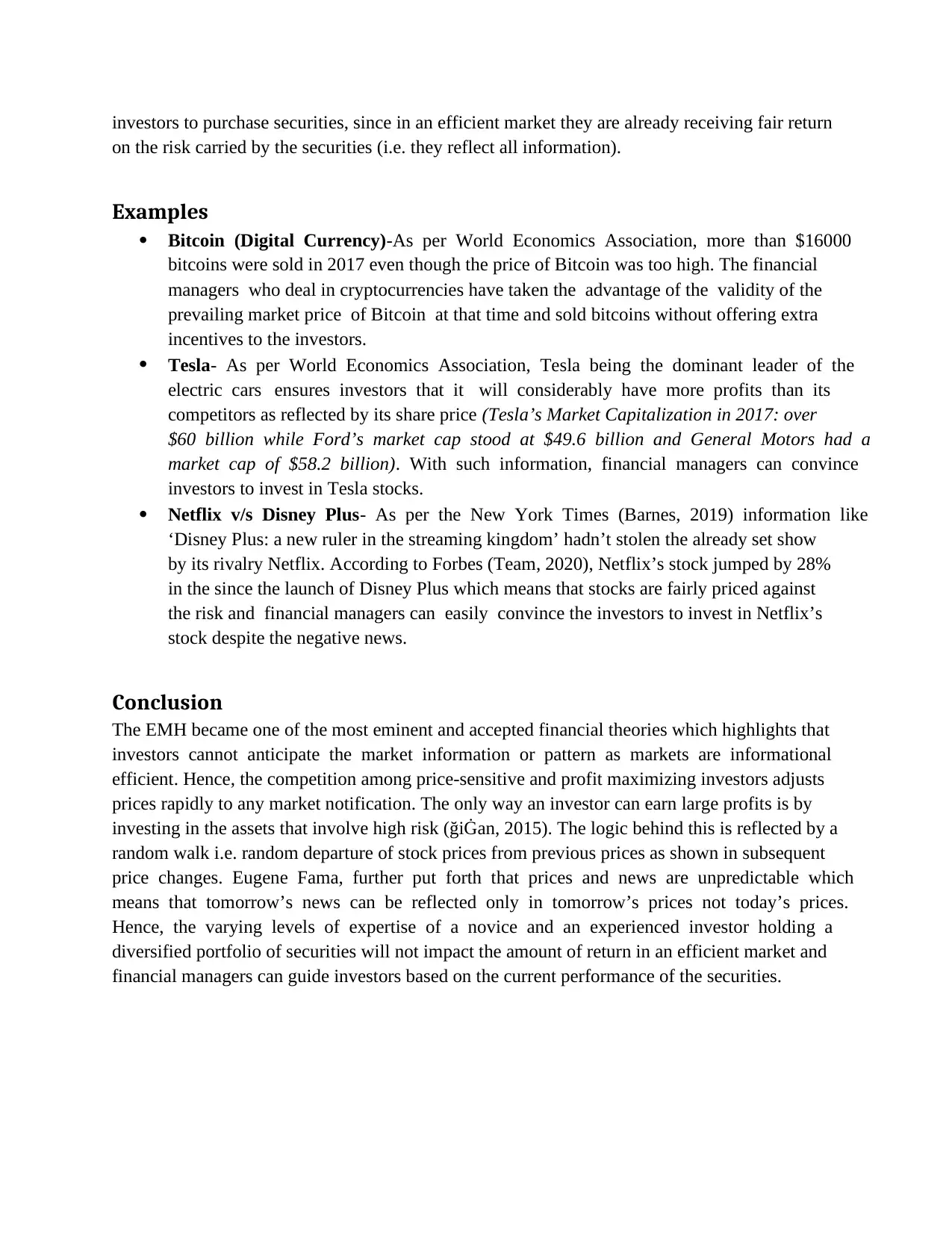
investors to purchase securities, since in an efficient market they are already receiving fair return
on the risk carried by the securities (i.e. they reflect all information).
Examples
Bitcoin (Digital Currency)-As per World Economics Association, more than $16000
bitcoins were sold in 2017 even though the price of Bitcoin was too high. The financial
managers who deal in cryptocurrencies have taken the advantage of the validity of the
prevailing market price of Bitcoin at that time and sold bitcoins without offering extra
incentives to the investors.
Tesla- As per World Economics Association, Tesla being the dominant leader of the
electric cars ensures investors that it will considerably have more profits than its
competitors as reflected by its share price (Tesla’s Market Capitalization in 2017: over
$60 billion while Ford’s market cap stood at $49.6 billion and General Motors had a
market cap of $58.2 billion). With such information, financial managers can convince
investors to invest in Tesla stocks.
Netflix v/s Disney Plus- As per the New York Times (Barnes, 2019) information like
‘Disney Plus: a new ruler in the streaming kingdom’ hadn’t stolen the already set show
by its rivalry Netflix. According to Forbes (Team, 2020), Netflix’s stock jumped by 28%
in the since the launch of Disney Plus which means that stocks are fairly priced against
the risk and financial managers can easily convince the investors to invest in Netflix’s
stock despite the negative news.
Conclusion
The EMH became one of the most eminent and accepted financial theories which highlights that
investors cannot anticipate the market information or pattern as markets are informational
efficient. Hence, the competition among price-sensitive and profit maximizing investors adjusts
prices rapidly to any market notification. The only way an investor can earn large profits is by
investing in the assets that involve high risk (ğiĠan, 2015). The logic behind this is reflected by a
random walk i.e. random departure of stock prices from previous prices as shown in subsequent
price changes. Eugene Fama, further put forth that prices and news are unpredictable which
means that tomorrow’s news can be reflected only in tomorrow’s prices not today’s prices.
Hence, the varying levels of expertise of a novice and an experienced investor holding a
diversified portfolio of securities will not impact the amount of return in an efficient market and
financial managers can guide investors based on the current performance of the securities.
on the risk carried by the securities (i.e. they reflect all information).
Examples
Bitcoin (Digital Currency)-As per World Economics Association, more than $16000
bitcoins were sold in 2017 even though the price of Bitcoin was too high. The financial
managers who deal in cryptocurrencies have taken the advantage of the validity of the
prevailing market price of Bitcoin at that time and sold bitcoins without offering extra
incentives to the investors.
Tesla- As per World Economics Association, Tesla being the dominant leader of the
electric cars ensures investors that it will considerably have more profits than its
competitors as reflected by its share price (Tesla’s Market Capitalization in 2017: over
$60 billion while Ford’s market cap stood at $49.6 billion and General Motors had a
market cap of $58.2 billion). With such information, financial managers can convince
investors to invest in Tesla stocks.
Netflix v/s Disney Plus- As per the New York Times (Barnes, 2019) information like
‘Disney Plus: a new ruler in the streaming kingdom’ hadn’t stolen the already set show
by its rivalry Netflix. According to Forbes (Team, 2020), Netflix’s stock jumped by 28%
in the since the launch of Disney Plus which means that stocks are fairly priced against
the risk and financial managers can easily convince the investors to invest in Netflix’s
stock despite the negative news.
Conclusion
The EMH became one of the most eminent and accepted financial theories which highlights that
investors cannot anticipate the market information or pattern as markets are informational
efficient. Hence, the competition among price-sensitive and profit maximizing investors adjusts
prices rapidly to any market notification. The only way an investor can earn large profits is by
investing in the assets that involve high risk (ğiĠan, 2015). The logic behind this is reflected by a
random walk i.e. random departure of stock prices from previous prices as shown in subsequent
price changes. Eugene Fama, further put forth that prices and news are unpredictable which
means that tomorrow’s news can be reflected only in tomorrow’s prices not today’s prices.
Hence, the varying levels of expertise of a novice and an experienced investor holding a
diversified portfolio of securities will not impact the amount of return in an efficient market and
financial managers can guide investors based on the current performance of the securities.
Paraphrase This Document
Need a fresh take? Get an instant paraphrase of this document with our AI Paraphraser
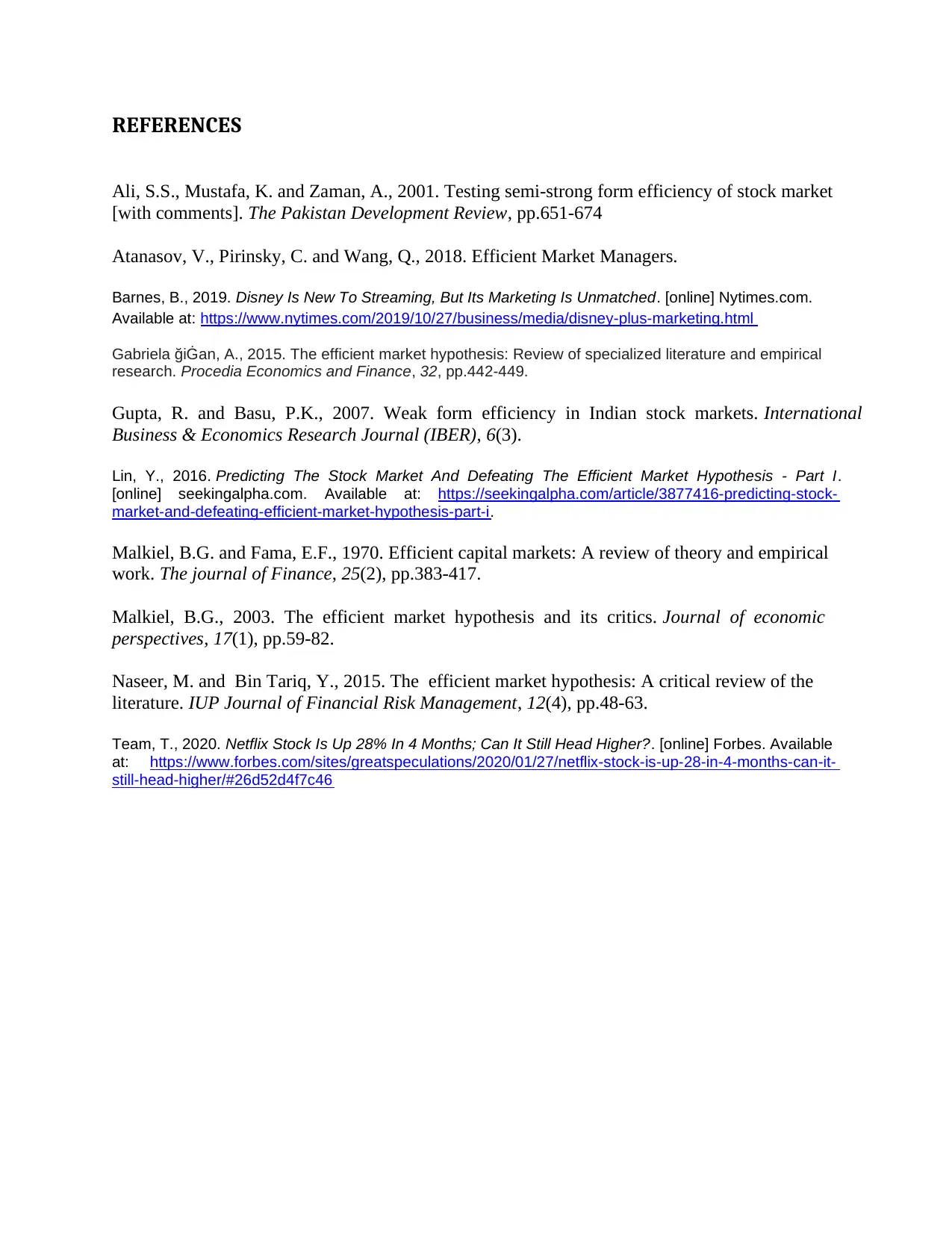
REFERENCES
Ali, S.S., Mustafa, K. and Zaman, A., 2001. Testing semi-strong form efficiency of stock market
[with comments]. The Pakistan Development Review, pp.651-674
Atanasov, V., Pirinsky, C. and Wang, Q., 2018. Efficient Market Managers.
Barnes, B., 2019. Disney Is New To Streaming, But Its Marketing Is Unmatched. [online] Nytimes.com.
Available at: https://www.nytimes.com/2019/10/27/business/media/disney-plus-marketing.html
Gabriela ğiĠan, A., 2015. The efficient market hypothesis: Review of specialized literature and empirical
research. Procedia Economics and Finance, 32, pp.442-449.
Gupta, R. and Basu, P.K., 2007. Weak form efficiency in Indian stock markets. International
Business & Economics Research Journal (IBER), 6(3).
Lin, Y., 2016. Predicting The Stock Market And Defeating The Efficient Market Hypothesis - Part I.
[online] seekingalpha.com. Available at: https://seekingalpha.com/article/3877416-predicting-stock-
market-and-defeating-efficient-market-hypothesis-part-i.
Malkiel, B.G. and Fama, E.F., 1970. Efficient capital markets: A review of theory and empirical
work. The journal of Finance, 25(2), pp.383-417.
Malkiel, B.G., 2003. The efficient market hypothesis and its critics. Journal of economic
perspectives, 17(1), pp.59-82.
Naseer, M. and Bin Tariq, Y., 2015. The efficient market hypothesis: A critical review of the
literature. IUP Journal of Financial Risk Management, 12(4), pp.48-63.
Team, T., 2020. Netflix Stock Is Up 28% In 4 Months; Can It Still Head Higher?. [online] Forbes. Available
at: https://www.forbes.com/sites/greatspeculations/2020/01/27/netflix-stock-is-up-28-in-4-months-can-it-
still-head-higher/#26d52d4f7c46
Ali, S.S., Mustafa, K. and Zaman, A., 2001. Testing semi-strong form efficiency of stock market
[with comments]. The Pakistan Development Review, pp.651-674
Atanasov, V., Pirinsky, C. and Wang, Q., 2018. Efficient Market Managers.
Barnes, B., 2019. Disney Is New To Streaming, But Its Marketing Is Unmatched. [online] Nytimes.com.
Available at: https://www.nytimes.com/2019/10/27/business/media/disney-plus-marketing.html
Gabriela ğiĠan, A., 2015. The efficient market hypothesis: Review of specialized literature and empirical
research. Procedia Economics and Finance, 32, pp.442-449.
Gupta, R. and Basu, P.K., 2007. Weak form efficiency in Indian stock markets. International
Business & Economics Research Journal (IBER), 6(3).
Lin, Y., 2016. Predicting The Stock Market And Defeating The Efficient Market Hypothesis - Part I.
[online] seekingalpha.com. Available at: https://seekingalpha.com/article/3877416-predicting-stock-
market-and-defeating-efficient-market-hypothesis-part-i.
Malkiel, B.G. and Fama, E.F., 1970. Efficient capital markets: A review of theory and empirical
work. The journal of Finance, 25(2), pp.383-417.
Malkiel, B.G., 2003. The efficient market hypothesis and its critics. Journal of economic
perspectives, 17(1), pp.59-82.
Naseer, M. and Bin Tariq, Y., 2015. The efficient market hypothesis: A critical review of the
literature. IUP Journal of Financial Risk Management, 12(4), pp.48-63.
Team, T., 2020. Netflix Stock Is Up 28% In 4 Months; Can It Still Head Higher?. [online] Forbes. Available
at: https://www.forbes.com/sites/greatspeculations/2020/01/27/netflix-stock-is-up-28-in-4-months-can-it-
still-head-higher/#26d52d4f7c46
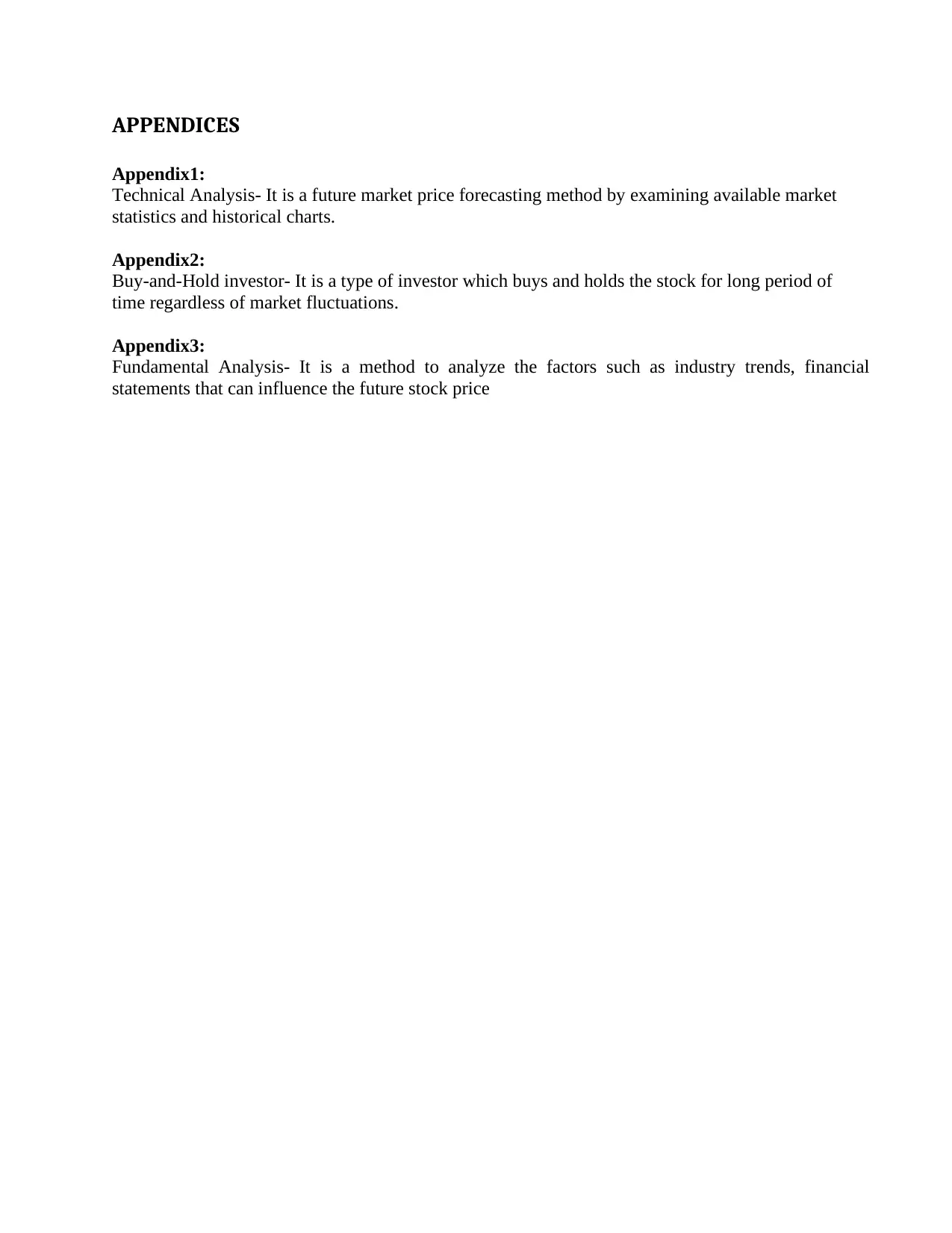
APPENDICES
Appendix1:
Technical Analysis- It is a future market price forecasting method by examining available market
statistics and historical charts.
Appendix2:
Buy-and-Hold investor- It is a type of investor which buys and holds the stock for long period of
time regardless of market fluctuations.
Appendix3:
Fundamental Analysis- It is a method to analyze the factors such as industry trends, financial
statements that can influence the future stock price
Appendix1:
Technical Analysis- It is a future market price forecasting method by examining available market
statistics and historical charts.
Appendix2:
Buy-and-Hold investor- It is a type of investor which buys and holds the stock for long period of
time regardless of market fluctuations.
Appendix3:
Fundamental Analysis- It is a method to analyze the factors such as industry trends, financial
statements that can influence the future stock price
⊘ This is a preview!⊘
Do you want full access?
Subscribe today to unlock all pages.

Trusted by 1+ million students worldwide
1 out of 6
Related Documents
Your All-in-One AI-Powered Toolkit for Academic Success.
+13062052269
info@desklib.com
Available 24*7 on WhatsApp / Email
![[object Object]](/_next/static/media/star-bottom.7253800d.svg)
Unlock your academic potential
Copyright © 2020–2026 A2Z Services. All Rights Reserved. Developed and managed by ZUCOL.





